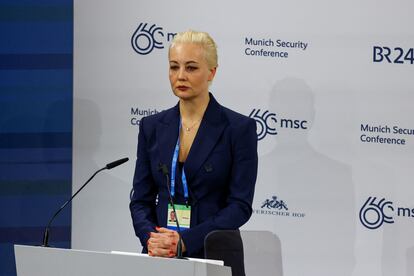Yulia Navalnaya, Alexei Navalny’s wife: ‘Putin will be punished. That day will come soon’
On the same Munich stage where Putin delivered his famous 2007 speech announcing his rejection of the current world order, the dissident’s partner urged the international community to fight against the Russian regime

Yulia Navalnaya, Alexei Navalny’s wife, took the main stage of the Munich Security Conference on Friday, three hours after the Russian penitentiary services reported her husband’s death in prison. Wearing a dark suit and with glassy eyes but strong in her bearing and voice, she spoke for a few minutes after receiving lengthy applause from an audience packed with political, military and diplomatic leaders. “I want Putin and his people to know that they will be punished for what they have done to our country and to my family. They will be brought to justice. That day will come soon,” she said.
Navalnaya uttered those words on the same stage where, in 2007, Vladimir Putin delivered a historical and brutal speech in which he told the West that he rejected the existing global order. In it, he claimed de facto spheres of influence for the Russia that he had stabilized, vented his discontent and warned of what would gradually happen if the West did not relent. The West did not give in; it opened NATO to Ukraine and Georgia. Soon came the 2008 invasion of Georgia, then Ukraine in 2014, the operation in Syria in 2015 and the full-scale war on Kyiv in 2022. That external aggression has been accompanied by relentless internal repression, of which Navalnaya’s husband, Alexei Navalny, was one of the primary targets. These are the foreign and domestic components of Putin’s project to rebuild Russia as a great power based on the reflexive use of force.
“I am sure that, in my position, Alexei would have decided to get on this stage at this moment. I don’t know whether we should believe the terrible news we’ve only received from official media. For many years, they have lied constantly. But if it is true, I want Putin and his team to know that they will be punished for what they have done to our country and to my family. They will be brought to justice. That day will come soon. I call on the entire international community to unite, to fight this evil, horrible regime,” the dissident’s wife said.
The list of Putin’s victims is long, from journalist Anna Politkvoskaia to politician Boris Nemtsov. The repression, the strangulation of the fragile democracy that was trying to take root after the fall of the USSR, is there for all to see through brutal episodes. Western leaders came out to express their revulsion at the news. Just before Navalnaya, U.S. Vice President Kamala Harris spoke on the same stage, criticizing Putin’s brutality. Many others said much the same.
A divided international community
But the international community Navalnaya addressed is divided. At the U.N., a large majority of countries condemned the Russian invasion of Ukraine, but only fifty have imposed sanctions on Putin’s regime. It is a fragmented world in which the quality of democracy is eroding, and the idea’s attractiveness seems to be waning; in this world, camps are taking shape that do not seem to be changed by the heroic dissident’s death.
Authoritarian regimes like China, Russia, Iran and North Korea are closing ranks. So are Westerners and Asian-Pacific democracies, but they are unable to forge closer ties with the rest of the world. The countries in the global South, a heterogeneous group that includes regimes of various types, refuse to align or to take a position, focusing instead on defending certain interests, such as obtaining fair compensation for the environmental damage caused by others.
Not long after Putin’s famous speech in 2008, the West suffered a terrible financial crisis, followed by the consequences of popular discontent, the rise of populists and the dysfunction or outright paralysis of political systems, including the most representative of them all, the United States. In this context, the main authoritarian regimes were emboldened to take up the challenge, while others were more motivated to maintain equidistance.
This is the audience that Yulia Navalnaya addressed, one in which the unifying force of the idea of democracy is waning. Russia embodies the most direct and brutal challenge to that idea. On the same stage, Putin warned that he wanted to change the world order and, years later, he signed joint declarations with Xi Jinping affirming that democracy and human rights are relative concepts that vary according to each nation’s history and culture.
Will more countries align themselves with what Navalnaya’s speech in Munich in 2024 represents? Or will it be with the ideas espoused in Putin’s 2007 Munich speech? The answer will define the fate of the 21st century.
Sign up for our weekly newsletter to get more English-language news coverage from EL PAÍS USA Edition
Tu suscripción se está usando en otro dispositivo
¿Quieres añadir otro usuario a tu suscripción?
Si continúas leyendo en este dispositivo, no se podrá leer en el otro.
FlechaTu suscripción se está usando en otro dispositivo y solo puedes acceder a EL PAÍS desde un dispositivo a la vez.
Si quieres compartir tu cuenta, cambia tu suscripción a la modalidad Premium, así podrás añadir otro usuario. Cada uno accederá con su propia cuenta de email, lo que os permitirá personalizar vuestra experiencia en EL PAÍS.
¿Tienes una suscripción de empresa? Accede aquí para contratar más cuentas.
En el caso de no saber quién está usando tu cuenta, te recomendamos cambiar tu contraseña aquí.
Si decides continuar compartiendo tu cuenta, este mensaje se mostrará en tu dispositivo y en el de la otra persona que está usando tu cuenta de forma indefinida, afectando a tu experiencia de lectura. Puedes consultar aquí los términos y condiciones de la suscripción digital.









































